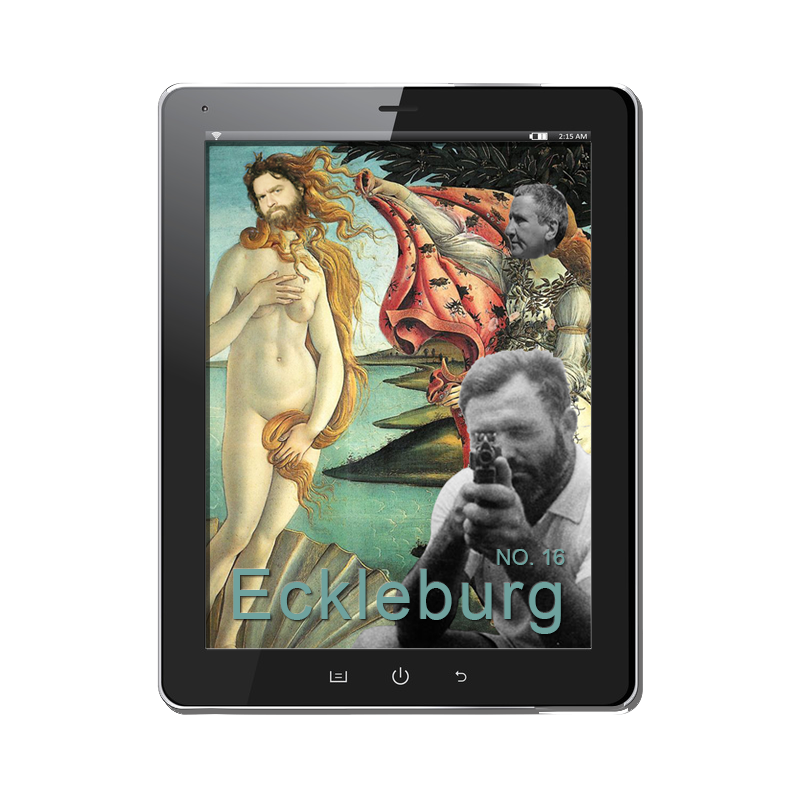Thomas Owen, “Les Guetteuses.” La Truie (1972)
Translation by Edward Gauvin
Here what we call chance and coincidence begin to work.
—Arthur Machen, Novel of the Black Powder
What a funny figure she cut, the little old lady sitting with her knees pressed tight, the tips of her shoes touching the ground, her large purse, worn and brown, clasped warily against her.
Alone on that bench, in that park, the setting behind her a grassy slope that ran up fairly steeply to a copse of birch and pine.
A man was walking by: dreamy, so lost in thought that a blackbird, shooting by like a bullet, almost knocked him off-balance. He stopped, collected himself slowly. From where he stood, he could see the old lady in a sunbeam, spotlit like a person in a play. Dark—almost too dark in the harsh light—against a backdrop of greenery the sun enlivened through the break in the clouds, she seemed, on her bench, like a neorealist statue whose sculptor had striven to perfectly reproduce daily life.
The sight of her, in her prim stillness, with her small round hat, also brought to mind little tin soldiers sitting rigidly upright, planted on iron tacks atop the caissons of a tiny artillery wagon.
Why had this little old stranger—banal, uninteresting, insignificant—caught his eye? As he drew closer, she lost her hieratic aspect. Remaining still all the while, stuck on an imaginary tack like a little gunner, she began to come alive in a remarkable way. Frozen there almost ominously, her gaze fixed on his, exerting a kind of magnetism. Such that, beneath their imperious interrogation, he submitted to what could only be called a strange enthrallment.
Sometimes such gazes meet your own: they seem to know you, seek to pierce your silence. And so, anywhere at all, you might stumble across such women, who stare at you as at someone familiar. Seated, like her, in a public place, seemingly idle; or else worn and resigned in a doctor’s waiting room; or patient on a station bench as if abandoned by the whole wide world.
Sometimes men stop for them. What signal are they obeying? Are they rescuers, or themselves in need of rescue? He didn’t stop. He knew these fearsome women. He hastened his step, passing quickly, pretending not to see. But no matter how careful a man may be, there’s always a snag. The eyes of the woman lying in wait met his for a moment, and he couldn’t keep from checking—furtively!—the expression on her face. And, like all the others, this one in the park had the truth of the unreal to it: a half-smile not a smile at all but a certain set to the lips, or rather the sudden absence of lips.
This time, he had the feeling that before him sat a skeleton in clothes, that these were dolled up bones to be buried without delay. Hiding the reality didn’t work. It was always obvious. Why try to lie and conceal?
Two yellow butterflies fluttered about, mingling with merry agility. An old unfolded newspaper stirred weakly, snagged on the low iron fence around the lawn.
He’d stopped a few yards away from the old woman. He could no longer see her very well, but sensed all around him the malevolent waves emanating from her frail person.
“Get out of here!” he suddenly cried. “Go on, beat it!”
He didn’t care if he offended her. It felt like lawful self-defense. Or rather, having lost all control of himself, he reacted like a drowning man who’d hit on a few occasionally useful flailings.
To his great relief, the woman rose, worried, her head turned oddly, like a hen sensing danger. He gave a menacing wave of his arm. She beat a hasty retreat, quite brisk despite her age.
At once wretched and filled with hate, he watched her draw away. When she walked, her rear shifted a bit to one side, like some dogs.
He was trembling all over.
***
A brand new awning with blue and white stripes gave the café terrace a fresh, well-kept air. Few customers at this hour of the morning. In one corner, a woman in her forties, garish, fat, and common. She kept to herself, likely tired, slumped, legs spread and arms dangling. Beside her, a brown canvas shopping bag from which peered the green of leeks wrapped in newspaper.
From where he stood, he could tell at once the kind of person she was. The woman was hot and her flushed face gleamed with sweat. Her skirt, hiked up past her knees, showed her thighs’ unhealthy white above her drooping hose. She seemed to be staring apathetically at the ground, but he soon saw she was watching him, her false detachment but a way to lull his mistrust. So, too, waits the octopus in a hollow of the rock, seeming harmless as seaweed so as not to frighten its prey.
But for those who know, a glance gives it away.
He had to escape as quickly as he could, avoid the risk of falling into her trap.
But a wicked imp prodded him on. He went and sat down far from her, on the same terrace, in a place where he could observe her without fear of catching her gaze. Still, she’d not only spotted him, she’d surely seen him coming from far off. Her pose was studied, casual only in appearance. Her mischievous, slovenly posture was a challenge. He watched her now, lifting her hands to her hair as if to tighten her bun, her raised arms each revealing a reddish armpit. She rubbed her side, then brusquely, deliberately, turned toward him and pursed her lips obscenely, to provoke him.
He closed his eyes and concentrated on peaceful images. He saw himself as a young boy in his toasty bed at dawn. Everything was cottony quiet. He rose, sensing some important event. The floor was cold beneath his feet. He pulled the curtains aside. It had snowed. Everything was white, had changed shape. He ran back to his bed quickly and jumped in. He was happy…
Returning to childhood is an escape. Relating a grown man’s grief to a child’s joys or sorrows puts the former in a different light, makes them easier to bear. Anyway, he felt like he’d gone back in time and gotten some breathing room…
When he emerged from his reverie and these reflections, the woman was gone. She’d quit the game. So it was a good technique, then.
“Do you know that woman?” he asked the waiter.
“What woman?
“The one in the corner just now.”
The waiter gave the man a look as if he were joking, and assured him no one had been sitting there. He seemed sincere, and gave no reason to believe he’d been in cahoots with the woman.
Of course something had to burst his bubble. At the foot of the abandoned chair, he spotted the forgotten shopping bag. Out peered the green of leeks, wrapped in newspaper.
The man didn’t insist with the waiter. He was too happy to have escaped the evil spell.
***
She was sitting quite freely, body thrown back, one arm thrown over the bench—her hair, which she tossed from time to time with a shake of her head, hanging over her face. Her legs were crossed, and when he sat down beside her in that deserted park, where they were alone, she remained utterly indifferent. Nothing led one to believe she’d even noticed his presence, and this upset him. She wore a mauve dress with white flowers, or the reverse, and these colors made her bare, slightly hairy legs look wan.
She had a perfectly nice face, symmetrical, with a broad forehead and eyes he had a hard time picking out in profile, but which seemed intelligent. Anyway, they were carefully shadowed in a dramatic way. Her lips were thin and pale, and when, a few seconds later, she ran her lipstick (so pink!) over them, he glimpsed teeth that were well-cared for but dull.
The young woman had something of the dreamer about her, unhealthy and inexplicably alluring.
It was hot and quiet. In this special place, you forgot the city. And yet, through the trees, not so very far off, tall white buildings could be made out.
A flock of pigeons passed quite low with a sound of tearing silk and, at that very moment, both of them lifted their heads to follow the flight.
She didn’t really return his smile, and checked the time with a funny little swing of her arm.
The sky was overcast, and the air grew heavier. A gust of wind, heralding a storm, stirred a few dead leaves, a crumpled wrapper, and a great deal of yellow dust.
As though at some signal, the young woman started rummaging through her purse, checking that she had her nylon raincoat and the neatly folded transparent hood that went with it.
When the first drops of rain began to fall, she covered her head, saying, “I have to protect my hair!”
The she handed him the raincoat. “Put this on, you’ll ruin your suit. This cotton dress won’t run.”
She helped him put on the coat, which was slightly too small for him, and dragged him running through the rain, now falling in earnest, toward the distant shelter of the houses outside the park gates.
When they’d found refuge in a corner, he finally examined her at greater leisure. She was giggling, her dress clung to her body quite indiscreetly, and, with two fingers, she peeled the thin fabric from her chest.
There was something so kind, so endearing about her that he took her hand, as though to warm it between his.
“You can have your raincoat back,” he said. “It’s useless.”
“What’s the point?”
But he was already draping it over her shoulders. He could smell the wet nape of her neck where the ends of her dark locks, sticking out past her hood, met up with the lighter hair that went down the length of her spine. He would’ve liked to prolong the moment of fortuitous intimacy.
But the shower was nearing its end. Passersby were already venturing into the streets, avoiding puddles.
“C’mon,” she said, “I don’t live far. Come over and have a whisky. We’ll get to know each other.”
A few minutes later, she opened the door of her apartment and stepped aside to let him in. For a split second he glimpsed in her face the bony undervisage that is the sign of death, and which we all wear under life’s mask.
But he didn’t yet understand…
A moment later, he was tearing down the stairs like a thief.
Luckily he’d spotted in time, down the hallway—there was no more room for doubt—the thing that had made him flee. A brown canvas shopping bag from which peered the green of leeks wrapped in newspaper.
***
This time he was in a slightly shabby outlying borough, in a small plaza hemmed in by great gray houses and protected from traffic by a few signs forcing cars to detour sharply around it. Which unfailingly produced screeching brakes and squealing tires.
A small atoll of meager greenery, with a few stands of dusty trees, patchy grass, backless benches and, in the middle, a square of sand.
Children chased each other about, shouting, poorly hidden by the skinny trees, pretending to have fun.
Absent-mindedly, he’d skimmed a paper left there from the night before, and was not looking around with the incurable lassitude of those at loose ends.
Leaning against a shack that housed the gardeners’ tools, whose thatch roof reached out in an awning offering shelter from rain, a little girl with a lecherous air had been staring at him for some time.
She was running the tip of her finger over her lips and around the rings under her eyes. She wore a dress of pink wool, dirty and loosely knit, badly rumpled near the bottom.
He gave her a mechanical smile, which she pretended not to notice. Then, giving the bench a pat, he invited her over to sit beside him.
She understood his gesture and approached slowly, lollygagging idiotically, at once pleased and mistrustful, darting looks left and right to make sure no one had guessed her little game.
Suddenly they were alone in the little square, as if some spell had isolated them from the world, as if all the city kids’ noisy games, a minute ago raging and now gone, had been but a well-directed prologue to the play in which he was now about to star.
The gamine straddled the bench and, with spread palms, smoothed her skirt flat against it, which when she’d climbed up had showed her pale, thin thighs.
He was vaguely aware of the danger and already regretted so foolishly flirting with it. This seedy-looking child: where did she get such insolence, such confidence?
“Hello,” she said. “Don’t recognize you. You come here often?”
“Sometimes. But I’ve never seen you before. What’s your name?”
She dodged the direct question and replied, her lowered eyes avoiding his gaze, “You’re so thin! Are you sick? And you didn’t shave!”
He couldn’t help but smile at this mixture of candor and provocation. But soon his face grew serious again.
“Are you mad?”
“Not at all.”
“I don’t know if you’re old or young.”
“I don’t know either.”
“I don’t like it when you laugh.”
There was a moment of silence during which their thoughts followed rapidly one on the next. They looked at each other, surely without seeing, wholly absorbed by what was going on within.
Then the girl asked, “Do you have any candy?”
“No. I’m sorry.”
“The others always have candy.”
“What others?”
“Y’know—the others!”
He was disconcerted, but curious. “They give you candy. Why?”
A little laugh, too curt. “Why do you think?”
A great melancholy had swept over him. His sight grew clouded, and he couldn’t see where he was very well anymore. A bitter taste rose to his mouth. His childhood, fled; the feeling of time passing too quickly; regret for memories beyond reach. Too late now to change a thing about his fate.
A chilly, friendly little hand had taken his own. He was forced to his feet. As in a dream, he let himself be guided by the devious child, a miniature woman with a funny, nasty face.
When they left the plaza and were walking side by side in the street, he felt his very life at stake, that he’d just crossed some invisible threshold to another world. There was no more chance of turning back. Besides, he’d struggled too greatly in vain to shake off, today, the premonition that had been oppressing him for months.
They entered a squalid house smelling of lye and leek soup. They walked into a room utterly bare but for a large iron bed with knobs of brass.
They were there, all three of them, completely still, lined up against the wall, and seeing them together, he suddenly realized how much they looked like each other. Like judges, a single evil smile on their stony faces.
He understood that already knew, had known forever, what he was going to do, and what crime they would finally able to avenge.
The girl ran her finger over his lips.
Thomas Owen (1910-2002) is the one name regularly cited with Jean Ray as a pillar of Belgian fantastical fiction, and the nom de plume of Gérald Bertot: criminal lawyer, art critic, mystery writer, and career manager of a flour plant. In more than 300 stories over the course of his lifetime, Owen refined the tale of supernatural horror to an almost anachronistic degree of economy and purity. His unsettling work has been praised by Thomas Ligotti and compared to that of Poe and Buzzati.
The winner of the John Dryden Translation prize, Edward Gauvin has received fellowships and residencies from the NEA, the Fulbright Program, the Centre National du Livre, and the American Literary Translators’ Association. His volume of Georges-Olivier Châteaureynaud’s selected stories, A Life on Paper (Small Beer, 2010) won the Science Fiction & Fantasy Translation Award and was shortlisted for the Best Translated Book Award. Other publications have appeared in Tin House, Subtropics, The Harvard Review, The Southern Review, AGNI Online, and PEN America. The contributing editor for Francophone comics at Words Without Borders, he translates comics for Top Shelf, Archaia, and Lerner.









